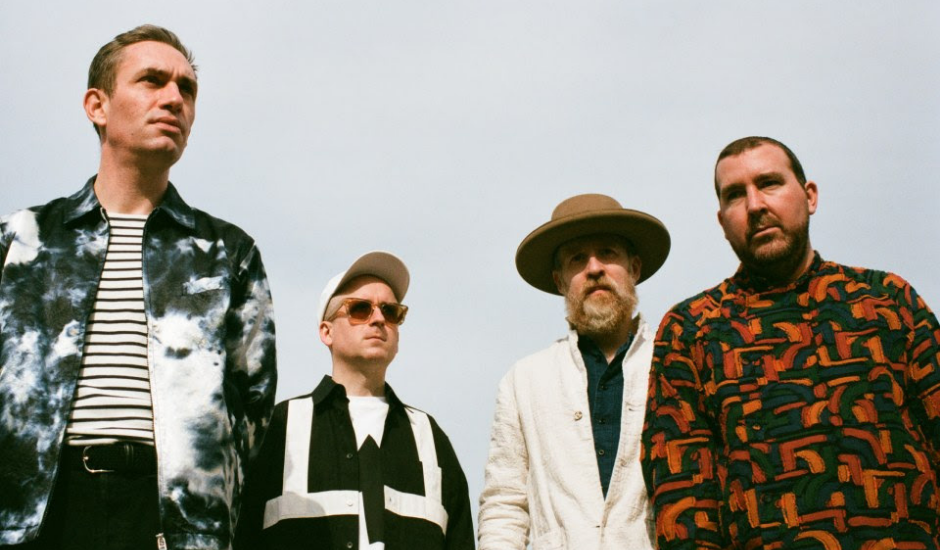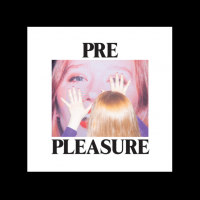 Thelma Plum’s Inspiring Homecoming"It was really nice to be here for so long because I kind of started writing how I used to write - I wrote because I really wanted to write"
Thelma Plum’s Inspiring Homecoming"It was really nice to be here for so long because I kind of started writing how I used to write - I wrote because I really wanted to write"

The Music & Machines of Hot Chip
“It’s like a negotiation between the person and machine involved and it becomes quite useful”
Titling their debut album Coming On Strong, released way back in 2004, may have been a good omen for influential British indietronica trailblazers Hot Chip, as nearly two decades later they are still doing just that, with constant tours and seven full-length studio albums emerging in that time.
Managing to strike the balance between having a signature sound while also refusing to be pigeonholed, Hot Chip have influenced countless bands and producers over the last twenty years with their broad palette of styles they dip into ranging from the more obvious synth-pop and indie dance genres, a healthy dash of house and disco, but also subtler references like r&b and even punk ethos that permeate the group’s releases.
Now returning with their eighth album, Freakout/Release sees the band show just why they’ve had the longevity and success they have, reaching back to their roots on some tracks while also pushing their sound forward, the record also sees the band’s creative chemistry at an all-time high and very future-focused, a truly rare phenomenon for a band at this point of their career.
To find out all about the new album, the group's delightfully named Relax & Enjoy studio, how the band records these days, what they look for in a cover and what to expect from their upcoming live shows, we caught up with multi-instrumentalist Owen Clarke to find out more.
Before we get stuck into the album, I want to start off by asking not about one of your songs but about the Beastie Boys “Sabotage” cover, and I guess, before asking about that particular cover, broadly speaking when you guys are throwing around ideas for songs to cover, what are you looking for in particular?
Well, I think Sabotage is kind of slightly different in a way to other covers we do. Normally it’s kind of like a feasibility study almost, it’s ridiculous, because there's quite a few of us who play, you know, and we're on stage live and we have like a host of machines. So we’ve kind of got like, capabilities in terms of covering songs to kind of do anything, because we could just take the MIDI from somewhere, and, you know, make it happen magically. But obviously we all want to play and be together and make music so often it's like songs that we can fit in amongst our own songs. So in the same key and such, so that we can segue into it or whatever. But with Sabotage it's’ completely different sort of case in point, I think just because it's so short and punchy. And like guitar, bass, drums, it's got like a couple of drones in there.
But our bass drums and vocal are very distinctive, and have such,a very specific mood and energy that we kind of thought, we didn't think it was a bad idea, but we thought it was, like, kind of like a dumb idea. And that was massively appealing about it. So obviously, for us, you would think, “Oh, Hot Chip, maybe we would do, you know, some sort of slightly older disco, electronic sort of cover”. And so we thought this would be just something sort of very different and just very fun, like a sort of little sort of jolt in the arm. And yeah, from that, we kind of remembered a lot of the earliest stuff that we’d been doing, you know, Coming On Strong, sort of around that time before The Warning even where it was kind of much more like, at the limit of our capabilities, and about the fun of, you know, that sort of noise and energy. So that kind of informs the record in some ways, the new record that's coming out.
I love that and I can’t help but think there’s something more circular going on here, like you guys need to now cover the older punk Beastie Boys after you’ve sort of gone back to your roots covering a Beastie Boys “newer” hit if that kind of makes sense?
Yeah, I mean, I think those kinds of things are embedded in the DNA of Hot Chip that never really come across, I suppose, and will not never come across, but they're quite deeply embedded. And so, I always think I always like the idea of tracking across all of the Hot Chip records. There's always like, one or two r&b sorts of tracks or whatever, not r&b tracks, but like, influenced by either the production ideas or you know, the vocal phrasing of r&b. And if you were to sort of bring them all together, around at this point, having done this being our eighth record, you'd have enough to put together an r&b record. So I think, to get back to your point, that sort of punk era - we’re not like a punk band you know, a seven piece punk band is a bit weird and also electronic… I mean, these sound like great ideas to me, but it’s kind of more the energy. Not “the energy of punk”, that sort of cheapen or demeans punk to some extent, but that kind of, I suppose, not a primal thing, but just a, whether it’s musically or vocally, that sort of articulation of tension, or just that catharsis, I suppose it’s something we were going for.
I will still go back to the “energy” word though and segue into asking about the energy in the studio where the new album was recorded. Relax & Enjoy studio, that name is already just amazing, so tell us about the studio and the vibe there?
Well, Al & Felix had a studio, I think it was like 2012 or something, and they built it together. And basically, it suffered some misfortunes - it was broken into, someone smashed a wall down to get into it and they kind of stole all the flashy looking stuff, but not the actually good stuff. And it was flooded at one point, but from a kebab shop so it was filled with rotting fat and all this stuff. So the studio moved to the other side of the building into an old Foam Factory, so inside there was like, I don’t know, it might have been knacker’s yard as well at some point, so it’s a very old Victorian building. On the floor there was stuff for like, maybe putting horses out of their misery, like tiles and rails and all sorts of quite terrifying things. So if you’ve got that kind of spectre of death and flooding and violence and in terms of breaking in, our thought was the best idea was to build a box within the box.
So in this old Victorian factory building, we build a sort of snug, little wooden box, basically because there’s neighbours all around as well. It all happened before lockdown, we were over in Australia at the end of 2019, and came back and then obviously, all kicked off with COVID and everything. So that was something that Al could feasibly go in and work on without sort of breaking lockdown rules. So he would sort of, you know, cycle in and work in this little sort of wooden box by himself. So yeah, he was able to put that together. And we tried it out, you know, doing some production for other bands, so it's all tested out, and everything was all set up and ready to go - we had all these wonderful old synthesisers, and they were all plugged in, and Adam had a big old desk setup.
The etymology of the phrase, Relax & Enjoy, that came from I think maybe an LCD Soundsytem thing, Rayna who had played with them until recently had that written on their keyboard, like “relax and enjoy the synthesiser” or “relax and enjoy the AMS unit” and that was like an idea that our life is like all of these sorts of, not intimidating machines, but these kinds of complex things or that these historical things or these brand new and intimidating things, that you should relax and enjoy them. So yes, that's kind of the the ethos of the studio and that's kind of how we went in like, you know, we all wanted to make a Hot Chip record, but also we all just, after everything that happened with the pandemic, we just wanted to enjoy being together and making music basically, so it was all there, it was all set up to work out well.
And so when it comes time to make a record in this newer studio, how do you guys track a record these days, is it everyone in the room together or individual takes, has it changed over the years?
This time around, we were building on techniques, they've come out of the last record, A Bath Full of Ecstasy, which we’d done at Phillipe Zdar’s [Cassius] studio, , and that’s basically the most fun thing that we did. We had lots of fun with him and being there, but the most fun in terms of practice, or you know, work or whatever you want to call it, was like having keyboards all plugged in and playing together. And it's just like, “oh, well, turns out that that sort of genesis of music is a really fun thing”. And obviously, but I think like, historically, it's been more of an additive sort of process. So starting with a demo, which is either very sparse or very strong, either way, both kind of present opportunities, and then adding to that, and then getting to a stage where it's either overwhelming or it's done.
And then being more reductive and sort of stripping things away., so, fairly standard practice, I think, for music production. But I suppose it's kind of how you negotiate that with a group of people, and in a way, the easiest thing is to kind of not the easiest thing, but the most fun thing and easiest thing is to have everyone present and playing something at the same time, and not really decide whether it's good or not, just like go “that was a thing”, and move on to the next thing, and then like come back to those things and sort of decide whether they're good enough by themselves, or if there's aspects of them. And I think it's all kind of fairly standard practice but I think for us, it was a good practice to impose upon us because we are very much of the sort of adding bits school. And then, you know, the most fun thing is usually taking away bits towards the end. It was a blend of those three things, really.
So now I’m thinking with the jamming side of things, no judgement of what gets created as opposed to the additive side of things, are songs that are strongly built from jam sessions easier to play live cos you’ve kinda already done that first as opposed to songs that are really built from adding things?
You would think *laughs*. I think in terms of like chord structure and information it’s much more musical, I suppose, and then there’s the technical side which is all the MIDI and things like that - and I find myself somewhere in between. It’s more that the jams… jam, that is a terrible word, isn’t it? It’s not a bad word, but it doesn’t really… “the improvisations”? That sounds too high brow *laughs*. Generally what we’re doing is, as a player that is machine led in some way, whether it’s a MIDI line or even if there’s no time information being dictated from a computer or MIDI line, the modular synthesiser will have like an arpeggio or delay that will lead time in some way, the machine has a way of tapping you on the shoulder and saying “hey, I’m here as well, I’ve got something to contribute”. It’s like a negotiation between the person and machine involved and it becomes quite useful, it’s like “oh there’s something in there”.
Regardless of what we play with it, it’s like a little loop or whatever, there’s something machine like that you can remember what you built upon, like chicken wire or something, it’s like this “oh, it was there at the beginning and it’s still here at the end”, so it’s like chicken wire and you build all the stuff around that. So for whatever we play live, essentially we have to relearn the songs is what happens, because we’re not the sort of band that have demos rehearsed and go into a studio, record them and add bits. A demo might come in but no one’s ever really kind of fully played it. Alexis will often have sort of piano melodies primarily or some guitar things, and otherwise when Joe’s writing it’s more productions from the outset. So a lot of it is built in the studio, essentially.
So with the album nearly out while we’re chatting and hearing about how it all came together, you will be hitting the road with a heap of shows, including a few gigs down in Australia, what can people expect from the shows later in the year?
Well, we’ve got to prepare so basically, for some of us, we have to actually learn how the songs are played, so that’s a challenge and we’re doing sort of straight up rehearsals. And there’s a curious thing that happens when a record comes out where you have to do like cover versions for radio sessions, and shorter versions and stripped down versions. So you have to kind of learn how you did a thing, and then also learn how to do that in ways that you wouldn’t have chosen to have done. So we’re going to do all that and then we’re going to do production rehearsals and figure out how we are sort of presenting the show. There’s a thing in Hot Chip where we kind of want to be ourselves, which is kind of like an attitude. We don't want to pretend to be someone else and get caught out. It'd be too embarrassing. I think that's kind of, you know, we've never been able to do the rock and roll thing sort of convincingly, so there's this weird kind of image that's built up. So when it comes to sort of presenting the live shows, it's always difficult, we’ve got a lot of stuff, you've got a lot of people and you need to move them around the world and like, you know, make the music and not that the visual is secondary, but it’s how do we coalesce something over that. So in terms of staging, we’re actually trying to be ambitious, so I don’t know what it’s going to entail yet.
Well, we will all just have to wait and see! In the meantime, congratulations again on the new Hot Chip record and thanks so much for chatting, Owen!
Thanks, it was really nice talking with you.
Hot Chip’s new album Freakout/Release is out August 19 via Domino Recording Co
 Thelma Plum’s Inspiring Homecoming"It was really nice to be here for so long because I kind of started writing how I used to write - I wrote because I really wanted to write"
Thelma Plum’s Inspiring Homecoming"It was really nice to be here for so long because I kind of started writing how I used to write - I wrote because I really wanted to write"
 Album of the Week: Julia Jacklin - PRE PLEASUREAussie singer-songwriter has done it again on exquisite third album of introspective indie goodness
Album of the Week: Julia Jacklin - PRE PLEASUREAussie singer-songwriter has done it again on exquisite third album of introspective indie goodness